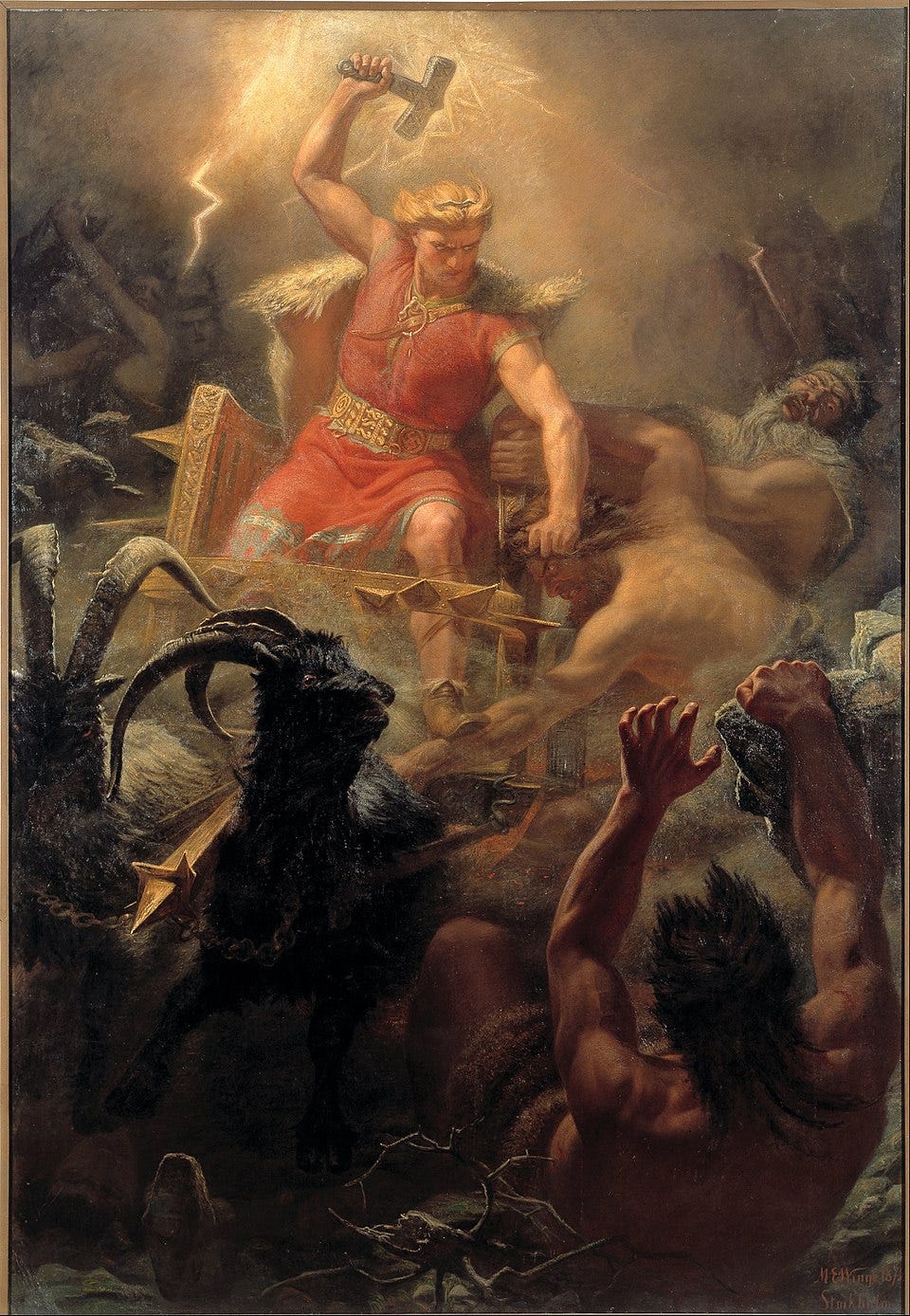Faith
An essay on belief without evidence.
Curled up on the couch, my girlfriend pulled a blanket over her head as a Pagan Priest slit the forearms of a Viking from elbow to wrist.
Blood poured from his arms and trickled into copper bowls below.
As the Viking took his final breaths, the Priest lifted a bowl to his mouth and drank the blood while looking up to the heavens, asking Odin to ensure the victory of their clan in an upcoming battle.
We were watching the show Vikings Valhalla on Netflix.
The Viking had volunteered to be sacrificed. His tribe was going to war, and they believed that sending a messenger to the gods to ask for support, by way of sacrifice, would improve their odds of victory on the battlefield.
The man who sacrificed himself wasn’t coerced or forced. He saw his sacrifice as a valiant and valuable way to depart Earth. After all, upon his death he would rejoice with the gods and his deceased loved ones in Valhalla. And those who witnessed the sacrifice didn’t label the Priest as a murderer, but as a portal to the omnipotent.
Today, we laugh and label those beliefs and the sacrifice that stemmed from them as crazy, immoral, or perverse. But for those people at that time, assuming this scene had some degree of historical accuracy, those beliefs were real.
Call it placebo, but if a firmly held belief delivers feelings of hope, brightness, and optimism, then it is real.
Watching this scene prompted me to think of faith.
Simply put, faith is belief without evidence.
What struck me while watching this Viking sacrifice was the power our faith has over us. We all walk through life with beliefs that lack evidence. Most are subconscious and, if asked, we’d struggle to identify, label, or justify them. We often only find out what we stand for when it’s challenged. And I believe that everyone has enough faith in something that they’d be willing to die for it.
More, we see our beliefs as capital-T True. We think we walk on a ground of solid, evidence-backed beliefs. This is a deception. Nearly all our beliefs are acts of faith.
This is clearly demonstrated by the energy Westerners waste debating political beliefs. The best-case scenario of sharing your political beliefs is the rah-rah affirmation of others who already agree with you. The worst-case is arguing with people who will never agree with you, as you slowly become more hooked on the feeling of being riled up and angry.
But no matter where your political beliefs lie, they are based on faith. You can’t prove you’re right. This applies to most domains. It’s impossible to prove your beliefs are right, yet you believe them anyway.
Part of the problem is that we have become a society addicted to Truth.
We think our faith must be placed in things that are irrevocably true.
Truth is good and should be our pursuit in disciplines where one Truth exists. But the problem with Truth is that, apart from a handful of scientific principles such as gravity, thermodynamics, and the like, it doesn’t really exist.
If we’re talking about Truth on any topic that is not provable by science, whose Truth are we talking about? My Truth? Your Truth? Their Truth?
In most domains, Truth is subjective.
Even scientific Truths are only true until proven otherwise. And science still requires a level of faith in the people who untangled the universe into mathematical equations and physics formulas.
The writer and entrepreneur Derek Sivers has an idea, “Useful Not True.” He even published a book on it. The basic idea is that people share perspectives, not facts. Pretty much everything is up for debate.
So, you get to decide and define your Truth. Your Belief. Your Faith.
Then life will be the judge of whether you choose right.
Reality has a way of teaching harsh lessons to those who misplace their faith. For example, if I develop the belief that people are only useful to me to the extent that I can use them to obtain my own self-interests, I will quickly end up alone and with no meaningful relationships. That is a wrong belief, and the world will punish me for it.
Conversely, I have the agency to place my faith in the right beliefs that will give me a solid foundation for a courageous and loving life.
Perhaps because of its extremity, death struck me as another good example of how our beliefs can embolden or fragment us.
Since our society today is largely secular, the prevailing belief is that we are here by luck and once we die, we will return to the same nothingness that existed before we were born. This makes me pretty sad.
Compare this to the belief that when we die, we are reunited with our loved ancestors that have already passed away and will rejoice with our living loved ones when their time comes. This makes me feel much better.
I don’t see myself as religious, and my point isn’t to compare religious beliefs to secular beliefs. But put plainly with religion removed, you’d be hard-pressed to find someone who wouldn’t cope with death better if they held the second belief, even if they still identified as agnostic.
You get to choose your beliefs. And those beliefs don’t have to be scientifically true. Rather, they can be acts of faith. But if you pick the right beliefs and believe them with your whole heart, you can live from a more solid foundation and draw from a well of boldness and love you couldn’t have otherwise.
With love,
Subscribe for new essays every month:






Good read!
I wonder how much we can choose our beliefs
Sometimes i feel I believe in god - whatever that means - other times not so much at all
Funny to think of beliefs as clothes we choose in different seasons